9 min read
How to Write a Rent Receipt: Practical Tips for Landlords
Learning how to write a rent receipt — and understanding its importance — is a crucial aspect of rent collection that every landlord must...

In most residential leases, there is a section outlining the covenant of quiet enjoyment. Many potential tenants tend to skip over this section when reading through the lease agreement, but the right to quiet enjoyment actually contains critical stipulations for both landlords and tenants alike. So what exactly is the covenant of quiet enjoyment and why is it important?
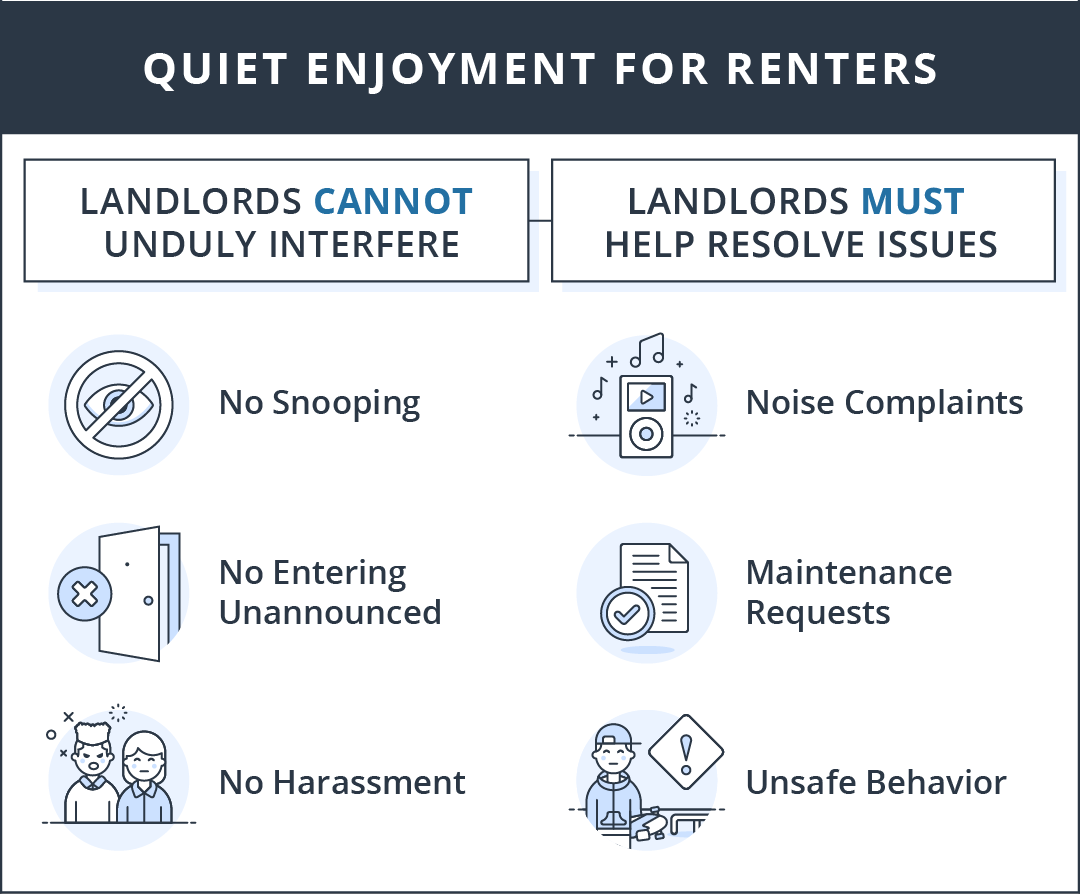
In terms of tenants and landlords, the right to quiet enjoyment is typically a two-fold definition. The first part states that tenants have a legal right to peacefully utilize their rented space without undue interference from the landlord. The second is that the landlord must assist the tenant in dealing with issues that are disruptive to their quiet enjoyment.
It should be noted that quiet enjoyment does not necessarily refer to noise at the property. Legally, “quiet” enjoyment is usually interpreted as the right to uninterrupted enjoyment.
Another legal distinction you may come across in a lease is an “implied” covenant versus a specifically defined covenant. Depending on your state and local laws, leases may contain an implied covenant, which simply means that both parties assume this agreement to be true. Tenants are agreeing to act in a peaceful manner, and landlords are agreeing to not disturb the tenants. In some cases, landlords may instead feel more comfortable outlining specifics for what tenants and landlords may or may not do within the bounds of quiet enjoyment.
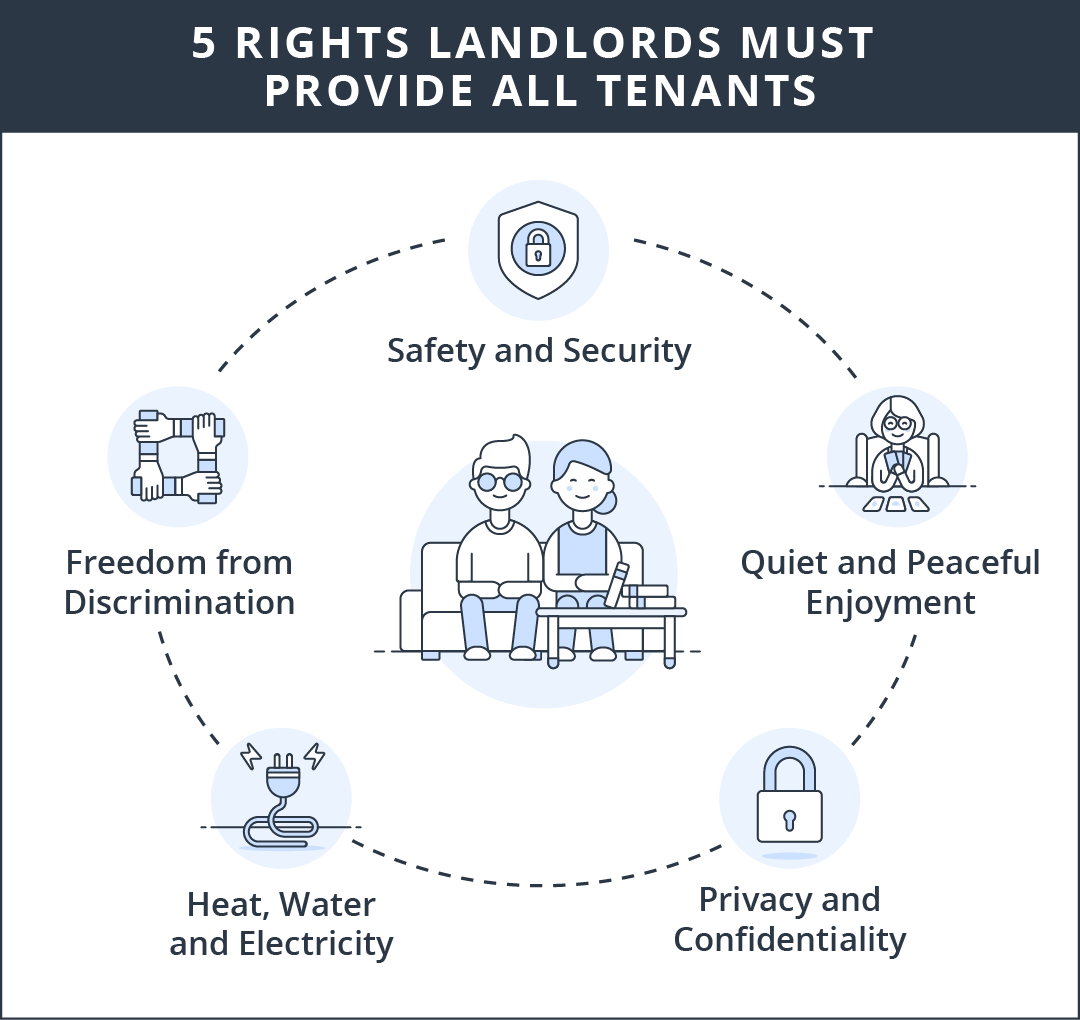
Though tenants are bound by the rules outlined in their leases, there are strict federal laws that landlords must adhere to in order to protect tenants. The right to quiet enjoyment is among these basic rights. There are also varying state and local laws across the U.S., but in general tenant rights can be summarized in five basic statements:
A key provision under quiet enjoyment is that tenants may not be disturbed in the case of a title action such as selling the property. A real-world example of this is when a landlord sells a house that is a rental in the middle of a 1-year lease. Many people, including real estate agents, might think that the new owner or buyer of the property can simply move-in. However, this is not the case. Under quiet enjoyment, the tenant must remain undisturbed for the remainder of the lease.
Now that we’ve defined the covenant of quiet enjoyment, below are some examples of tenant issues that can occur that landlords are obligated to address under quiet enjoyment. It should be noted that tenants themselves cannot violate the agreement as it is one-way, but landlords must still address issues caused by tenants in order to uphold quiet enjoyment.
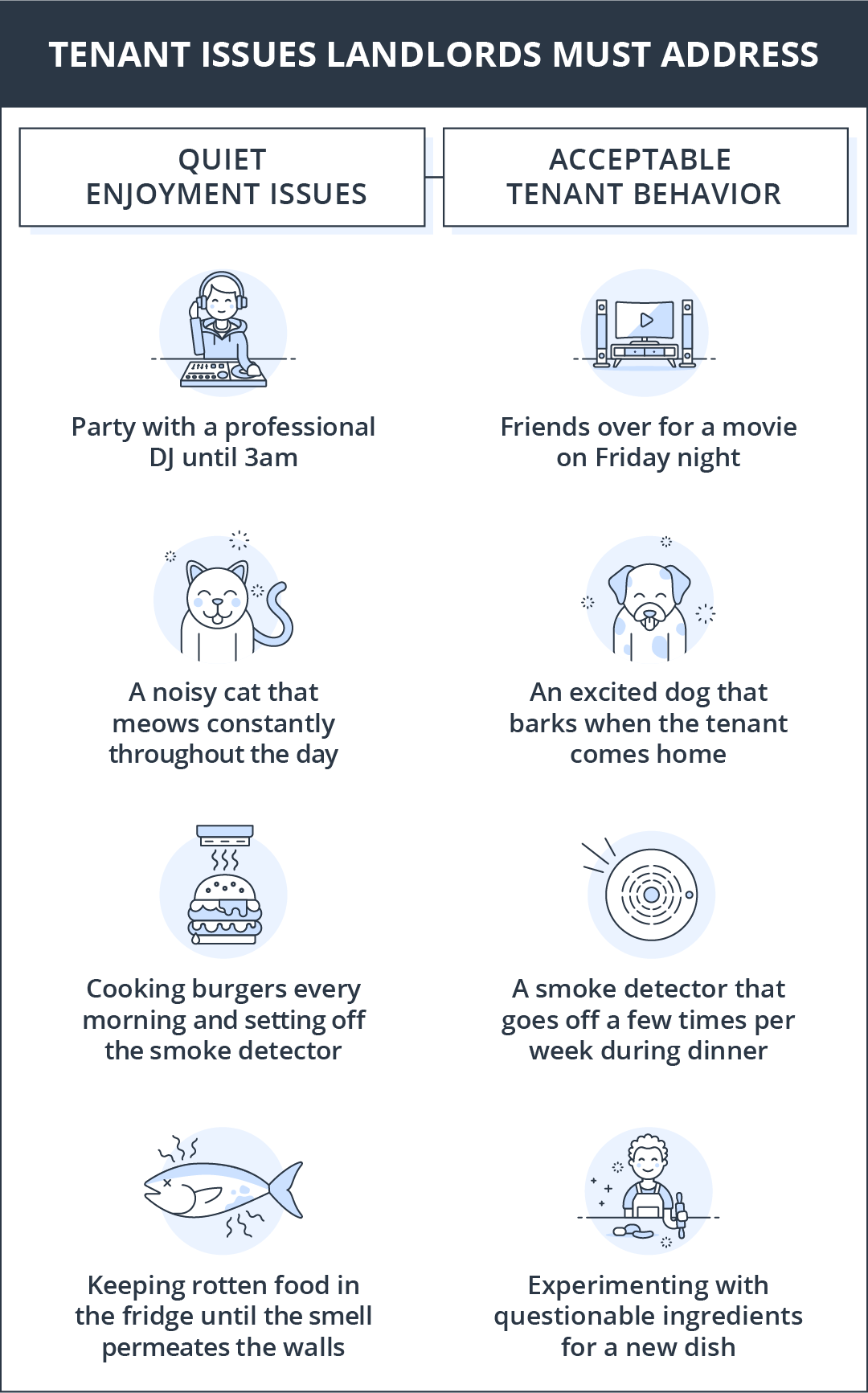
As stated above, quiet enjoyment does not necessarily mean silent enjoyment. Tenants are of course allowed to have friends and family over for get-togethers and celebrations. However, these need to stay within reason. Loud music and shouting that is continually disruptive to neighbors during the day or prevents them from sleeping at night is a major violation. If a tenant receives noise complaints, this is a clear sign that the landlord needs to take action.
Another obvious, but no less serious, violation of quiet enjoyment is tenants conducting illegal activities within their units. This most often takes the form of recreational drug use. Not only will the smell most likely bother neighbors, but they will feel unsafe as well. If that’s not reason enough, this type of behavior is also a major risk for the landlord.
Many apartments do allow dogs, cats and other animals within the units, but this can cause problems for other renters. For example, a new puppy left alone during the day may continuously bark and disturb neighbors, or a tenant may fail to pick up after their pet in shared outdoor spaces. This can lead to an unpleasant surprise for a neighbor! Landlords should be sure to visit the property periodically to make sure there aren’t any issues of this sort.
Another issue landlords must address is any behavior by a renter that makes another renter feel unsafe. This can include a wide variety of activities such as verbal or physical harassment, leaving the gate to the property unlocked or even people going in and out of the unit at all hours. Landlords should take immediate action if this type of activity is reported by a tenant.
Though not threatening to a tenant’s safety, this is one issue that makes a tenant angry! It’s disruptive to a tenant’s life when their neighbor uses their dedicated parking spot, not to mention disrespectful. This is doubly so if the tenant is paying extra for a spot in a lot or parking garage. Landlords are obligated to deal with these types of issues under quiet enjoyment.
The covenant of quiet enjoyment is a right tenants have, and there are a number of ways that landlords can break this right.
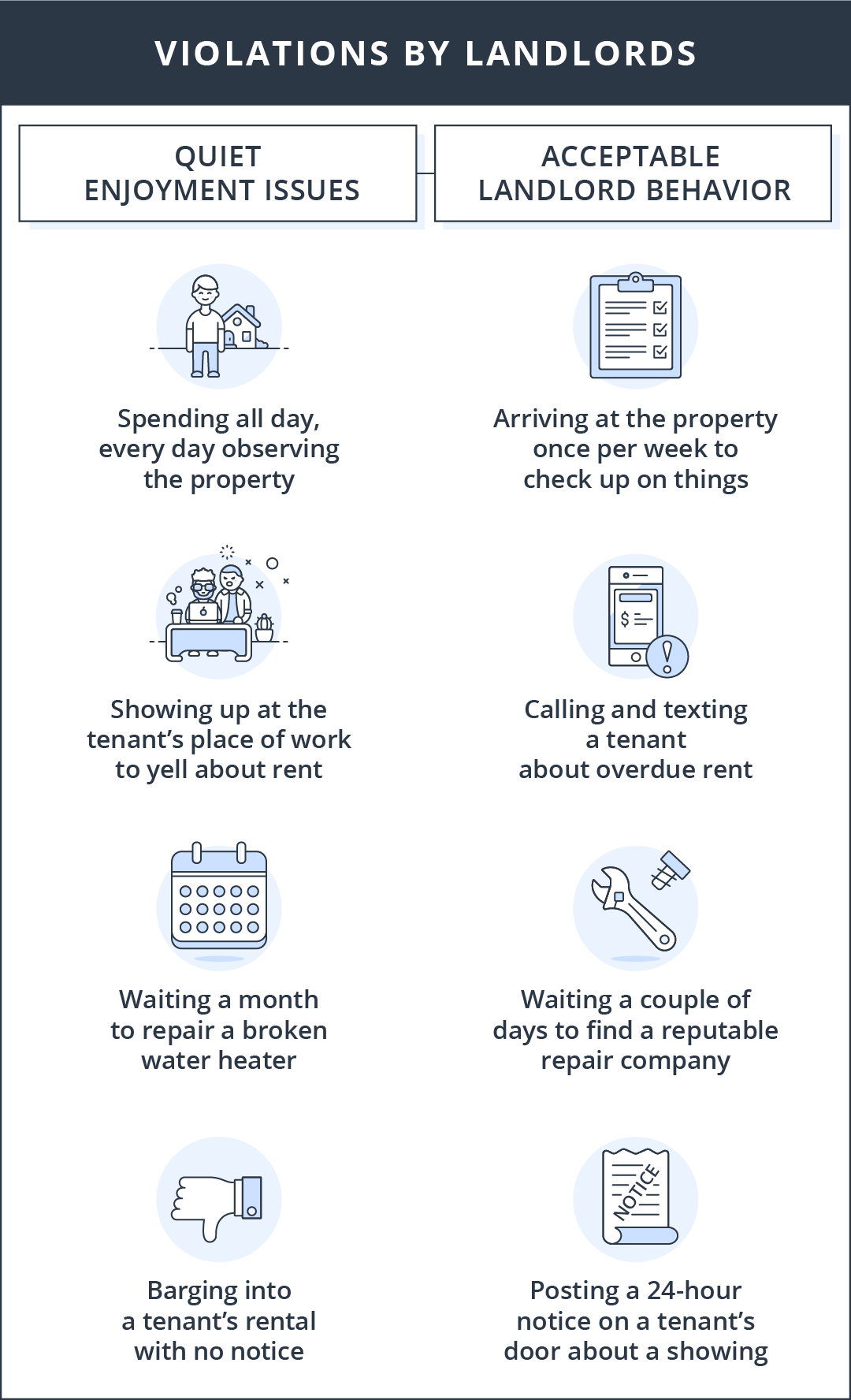
As mentioned above, the covenant contains two general stipulations. One of these points states that landlords must help tenants deal with issues that are preventing quiet enjoyment. If a tenant has filed a noise complaint against a neighbor or reported unsafe behavior, it is the landlord’s duty to take care of these problems and ensure each tenant is allowed to live peacefully.
Even if you are worried about how the tenant is treating your rental, it is very invasive to tenants if their landlord is constantly on the property. Give tenants the space they need to live peacefully. Snooping can also include frequent texts, emails and calls badgering the tenant about the rental or other issues.
This is one of the biggest errors landlords can make in violating the covenant of quiet enjoyment. Tenants will feel very violated if landlords storm into their homes unannounced, or if they come home and find that someone was in their apartment while they were out. Be sure to give proper notice if you need to enter the rental for repairs or showings, as this gives the tenants time to make arrangements.
Access to basic utilities such as water, heat and electricity is one of the five tenant rights outlined above. If the rental is not up to building codes and therefore inaccessible by utility companies, then it is not a fit habitat for anyone. Providing access to utilities can also include duties like making sure the water is turned on before renters move in, or manually activating radiators during the winter if the unit doesn’t have central heating.
As the landlord, you are in charge of keeping up with any structural maintenance that needs to be done on the unit. Though issues such as a clogged sink or broken cabinet door are not life-threatening, they are still disruptive to a tenant’s daily life and should be taken care of promptly.
Though issues do happen that landlords can’t prepare for, such as a broken water pipe or a wild animal taking up residence on the property, landlords do have a duty to fix these problems as soon as possible. Failure to do so can result in tenant action in two ways:
Neither of the above outcomes are desirable for either party, so here are some ways landlords can be sure their tenants are able to live peacefully.
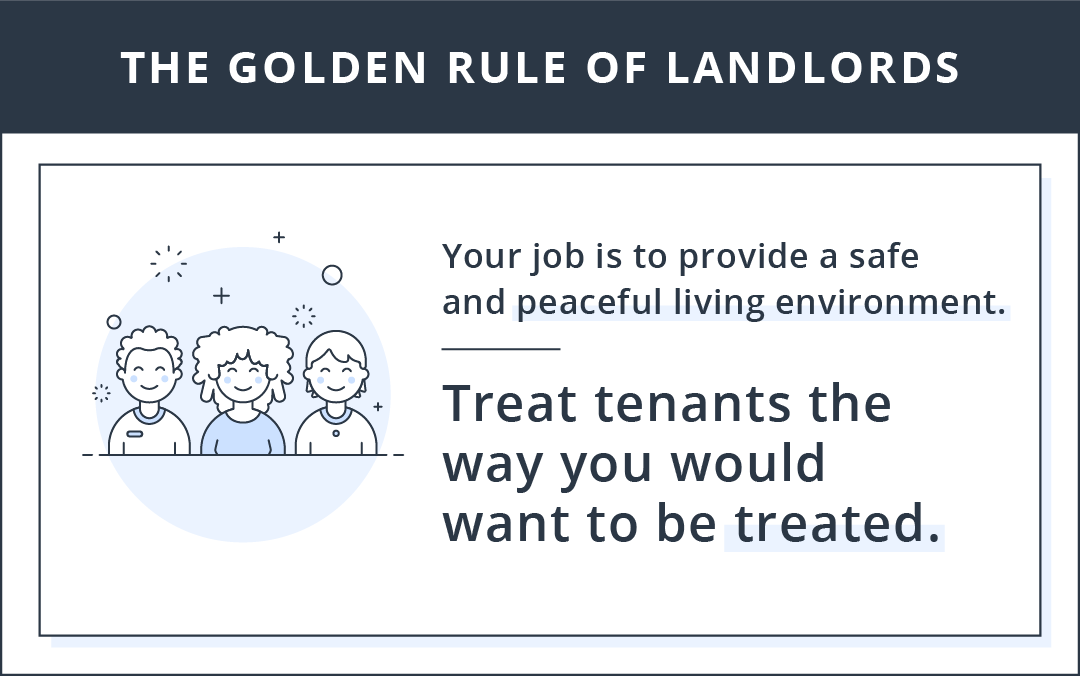
If there is an issue with the property, be upfront with your tenants and let them know about it. This shows that you value honest communication and they will know that you are already working to fix it. Be sure to respond promptly to any communication or complaints they send your way as well so they understand that you take their issues seriously.
If a tenant comes to you with a complaint, it is best to deal with it as quickly as possible. Whether this involves speaking to another resident about their late-night parties or sending a handyman to fix a leaky bathtub, a prompt response shows that you care about the tenant’s well-being and allows them to return to their normal lives.
If one of your renters has taken the time to draw up a letter about the ways you have violated their right to quiet enjoyment, you should take this as a serious sign that they may soon break their lease or even take legal action against you. Be sure to contact them directly and listen respectfully to their complaints so that you can best resolve their
We’re taught in school that the “golden” rule is to treat people the way you would want to be treated. This can be applied to renters and landlords as well! Always remember that tenants are paying you rent in exchange for a safe and pleasant home. Try to put yourself in their situation and address issues with empathy.
We hope that these definitions and examples will help you better understand your duties as a landlord when it comes to upholding the covenant of quiet enjoyment. When in doubt, always remember the golden rule. If you’re ready to take the first step in finding the perfect tenant for your property, take a look at our suite of property management tools and create your free TurboTenant account today.
Sources:USLegal | LegalMatch | CA Real Estate Commission
DISCLAIMER: TurboTenant, Inc does not provide legal advice. This material has been prepared for informational purposes only. All users are advised to check all applicable local, state and federal laws and consult legal counsel should questions arise.
9 min read
Learning how to write a rent receipt — and understanding its importance — is a crucial aspect of rent collection that every landlord must...
7 min read
As a landlord, managing tenant access while keeping your rental property secure can be a challenge—especially if you don’t live on-site. Lost...
16 min read
Real estate investors are a motivated bunch, and finding websites with resources that expedite the wealth-building journey can help add fuel to...
Join the 700,000+ independent landlords who rely on TurboTenant to create welcoming rental experiences.
No tricks or trials to worry about. So what’s the harm? Try it today!
TurboTenant, Inc., © 2025
Created in Sunny Colorado